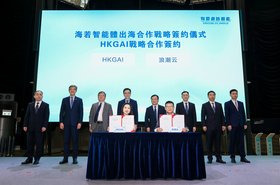The UK's Competition and Markets Authority (CMA) has released its provisional findings for its cloud services market investigation.
The investigation set out to see if there were elements of cloud service providers' offerings that had an "adverse effect on competition" (AEC), and has provisionally concluded that some AECs are arising from features of the market.
In the summary document shared by the CMA, it said that Amazon Web Services (AWS) and Microsoft hold by far the greatest market share in the cloud computing sector, noting: "We have provisionally found that AWS and Microsoft have been generating sustained returns from their cloud services substantially above their cost of capital in cloud services for a number of years."
The CMA additionally found that it is difficult for newcomers or smaller providers to compete with Microsoft and AWS, citing the vast capital investment in data centers, networks, servers, etc, "which become largely a sunk cost."
It adds: “There are also economies of scale, whereby larger cloud providers have lower ongoing costs. The largest cloud providers are making very large investments to expand their services in coming years, and while this investment can have procompetitive effects and benefit cloud customers, it may also deter market entry or expansion by potential rivals."
From a customer perspective, the CMA found that egress fees reduce the "ability of, and/or incentives for, customers to switch and/or multi-cloud to other cloud providers" and also reduce incentives of suppliers to compete for their rivals’ customers.
The summary included a section dedicated to Microsoft's software licensing products, noting that the company has a "significant market power" in relation to Windows Server, SQL Server, Windows 10/11, Visual Studio, and its productivity suites.
"We have also provisionally found that the Microsoft products are important inputs to cloud services, such that Microsoft has the potential to harm its rivals in cloud services when customers purchase cloud services that incorporate these products," said the summary, adding that it had found differences in relation to pricing and quality factors when customers used the software products on Microsoft cloud versus that of AWS and Google - "in fact, the price that Microsoft charges these rivals for some of these products can be higher than the retail price it charges its own customers."
Overall, the findings argue that Microsoft's conduct is harming competition. DCD has contacted Microsoft for comment.
Rima Alaily, Microsoft's deputy general counsel for competition said:
“The draft report should be focused on paving the way for the UK's AI-powered future, not fixating on legacy products launched in the last century. The cloud computing market has never been so dynamic and competitive, attracting billions in investments, new entrants, and rapid innovation. What could be better for UK businesses and government?”
Criticism surrounding Microsoft's licensing practices has long been at the center of the CMA's, and other regulators, investigations.
Dr. Maria Luisa Stasi, class representative in a £2 billion ($2.49bn) ongoing case against Microsoft, commented: “The CMA has rightly called Microsoft out for its anti-competitive practices. Microsoft’s software licensing prices were found to be higher for organizations using its rivals like AWS and Google, with the CMA adding that Microsoft has the ‘ability and incentive’ to foreclose its cloud rivals and harm competition.
"For many businesses and organizations, the damage has already been done. Microsoft has already overcharged them for software licensing and has done so for years. My case against Microsoft hopes to put that money – potentially billions of pounds – back into the pockets of businesses and organizations across the UK.”
Despite the seeming focus on Microsoft, the provisional finding of the CMA has also dragged AWS through the mud - with both being recommended for "SMS investigation" under the Digital Markets, Competition, and Consumers Act which came into force at the start of this year, to consider designating the companies as having "strategic market status."
Should AWS and Microsoft be found to be "SMS," they could be subjected to further investigation, and face conduct requirements, and reporting requirements.
While AWS has been vocal about its concerns with Microsoft's licensing practices, it has maintained a stance that competition between IT providers is "well functioning."
In response to the SMS investigation, an AWS spokesperson has said: "The proposed intervention under the Digital Markets, Competition and Consumers Act 2024 (DMCCA) is not warranted. The evidence demonstrates the IT services industry is highly competitive. Cloud computing has lowered costs for UK businesses with on-demand services and pay-as-you-go pricing, expanded product choice, and increased competition and innovation."
Despite the disappointing outcome for AWS and Microsoft, one silver lining for the cloud giants is that the investigation has concluded that "committed spend agreements" are widespread and do not harm competition in the market.
Google, while part of the "big three," has been notably left out of much of the provisional findings. The CMA noted its significantly smaller market share, as well as the impact that Microsoft's licensing has had on Google's own cloud offering.
In response to the findings, Chris Lindsay, vice president of customer engineering EMEA, at Google Cloud said: "We will continue to engage constructively with the CMA to support openness, innovation, and growth for the UK cloud market. Restrictive licensing harms UK cloud customers, threatens economic growth, and stifles innovation, and we are encouraged that the CMA has recognized the harm of these practices."
The CMA's investigation has been ongoing since October 2023. Its deadline is August 4, 2025.
Earlier this month, the CMA appointed a former Amazon Boss - Doug Gurr - as its interim chair of the CMA Board. It is worth noting that the investigation is undertaken independently of the CMA Board.







